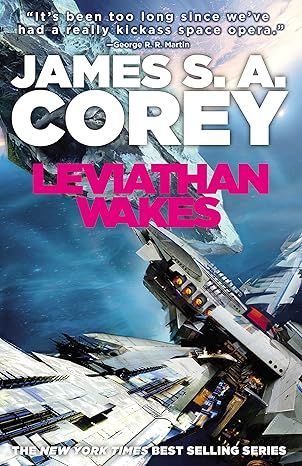Leviathan Wakes (The Expanse, 1)
4.6
-
52,335 ratings
From a New York Times bestselling and Hugo award-winning author comes a modern masterwork of science fiction, introducing a captain, his crew, and a detective as they unravel a horrifying solar system wide conspiracy that begins with a single missing girl. Now a Prime Original series.
Humanity has colonized the solar system—Mars, the Moon, the Asteroid Belt and beyond—but the stars are still out of our reach.
Jim Holden is XO of an ice miner making runs from the rings of Saturn to the mining stations of the Belt. When he and his crew stumble upon a derelict ship, the Scopuli, they find themselves in possession of a secret they never wanted. A secret that someone is willing to kill for—and kill on a scale unfathomable to Jim and his crew. War is brewing in the system unless he can find out who left the ship and why.
Detective Miller is looking for a girl. One girl in a system of billions, but her parents have money and money talks. When the trail leads him to the Scopuli and rebel sympathizer Holden, he realizes that this girl may be the key to everything.
Holden and Miller must thread the needle between the Earth government, the Outer Planet revolutionaries, and secretive corporations—and the odds are against them. But out in the Belt, the rules are different, and one small ship can change the fate of the universe.
"Interplanetary adventure the way it ought to be written." —George R. R. Martin
The Expanse
- Leviathan Wakes
- Caliban's War
- Abaddon's Gate
- Cibola Burn
- Nemesis Games
- Babylon's Ashes
- Persepolis Rising
- Tiamat's Wrath
- Leviathan Falls
Memory's Legion
The Expanse Short Fiction
- Drive
- The Butcher of Anderson Station
- Gods of Risk
- The Churn
- The Vital Abyss
- Strange Dogs
- Auberon
- The Sins of Our Fathers
Read more
Kindle
$0.00
Available instantly
Audiobook
$0.00
with membership trial
Hardcover
$26.99
Paperback
$11.24
Ships from
Amazon.com
Payment
Secure transaction
ISBN-10
0316129089
ISBN-13
978-0316129084
Print length
592 pages
Language
English
Publisher
Orbit
Publication date
June 14, 2011
Dimensions
6 x 1.5 x 9.25 inches
Item weight
1.4 pounds
Frequently bought together
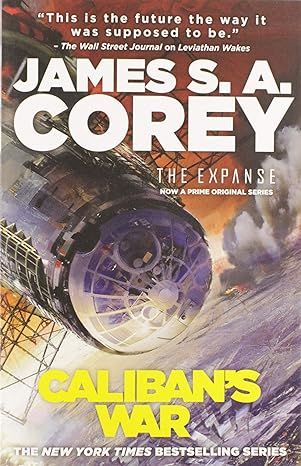
Caliban's War (The Expanse, 2)
4.7
-
37,849
$12.92
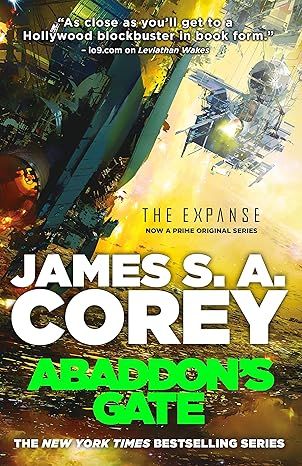
Abaddon's Gate (The Expanse, 3)
4.6
-
34,117
$11.99
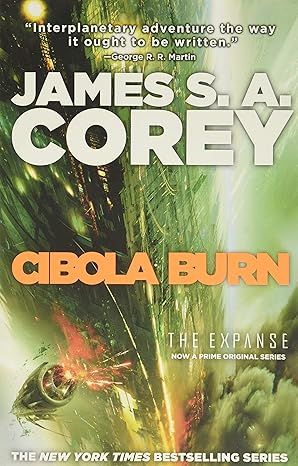
Cibola Burn (The Expanse, 4)
4.6
-
33,345
$11.99
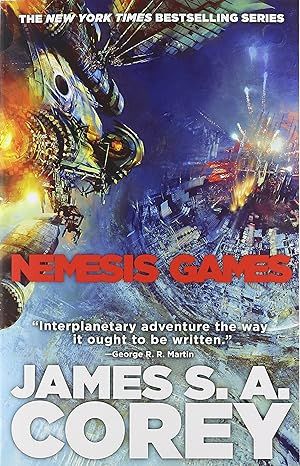
Nemesis Games (The Expanse, 5)
4.6
-
32,883
$11.99
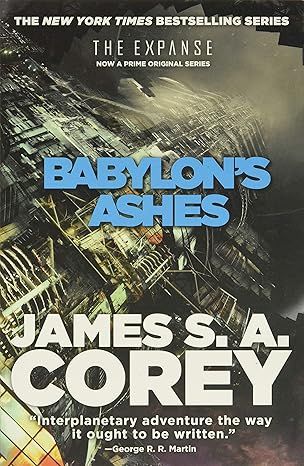
Babylon's Ashes (The Expanse, 6)
4.5
-
29,838
$11.99
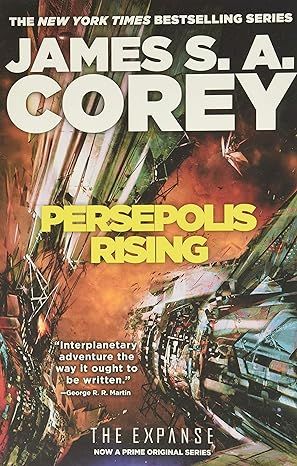
Persepolis Rising (The Expanse, 7)
4.6
-
25,957
$11.99
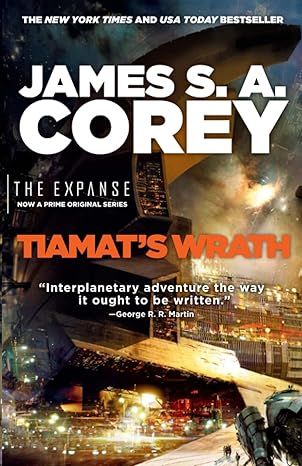
Tiamat's Wrath (The Expanse, 8)
4.8
-
27,918
$11.99
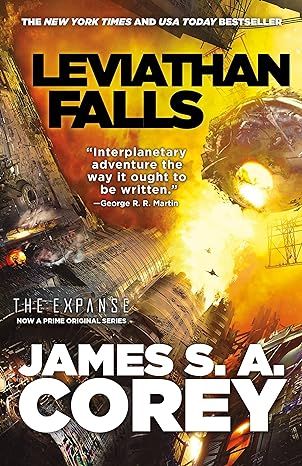
Leviathan Falls (The Expanse, 9)
4.8
-
25,849
$11.99
Popular Highlights in this book
The circle of life on Ceres was so small you could see the curve. He liked it that way.
Highlighted by 2,035 Kindle readers
A man born with a sense for raw opportunity where his soul should have been.
Highlighted by 2,014 Kindle readers
Working in some corporations was like going to prison. You adopted the views of the people around you.
Highlighted by 1,789 Kindle readers
Product details
ASIN :
B0047Y171G
File size :
2113 KB
Text-to-speech :
Enabled
Screen reader :
Supported
Enhanced typesetting :
Enabled
X-Ray :
Enabled
Word wise :
Enabled
Award Winners:
Editorial Reviews
"It's been too long since we've had a really kickass space opera. LEVIATHAN WAKES is interplanetary adventure the way it ought to be written." --- George R.R. Martin
"This is the future the way it was supposed to be." --- The Wall Street Journal
"As close as you'll get to a Hollywood blockbuster in book form." --- io9.com
"An excellent space operatic debut in the grand tradition of Peter F. Hamilton." --- Charlie Stross
"If you like science fiction with great characters and set in real space, you'll enjoy this one." --- Jo Walton, author of Farthing
Sample
Prologue: Julie
The Scopuli had been taken eight days ago, and Julie Mao was finally ready to be shot.
It had taken all eight days trapped in a storage locker for her to get to that point. For the first two she’d remained motionless, sure that the armored men who’d put her there had been serious. For the first hours, the ship she’d been taken aboard wasn’t under thrust, so she floated in the locker, using gentle touches to keep herself from bumping into the walls or the atmosphere suit she shared the space with. When the ship began to move, thrust giving her weight, she’d stood silently until her legs cramped, then sat down slowly into a fetal position. She’d peed in her jumpsuit, not caring about the warm itchy wetness, or the smell, worrying only that she might slip and fall in the wet spot it left on the floor. She couldn’t make noise. They’d shoot her.
On the third day, thirst had forced her into action. The noise of the ship was all around her. The faint subsonic rumble of the reactor and drive. The constant hiss and thud of hydraulics and steel bolts as the pressure doors between decks opened and closed. The clump of heavy boots walking on metal decking. She waited until all the noise she could hear sounded distant, then pulled the environment suit off its hooks and onto the locker floor. Listening for any approaching sound, she slowly disassembled the suit and took out the water supply. It was old and stale; the suit obviously hadn’t been used or serviced in ages. But she hadn’t had a sip in days, and the warm loamy water in the suit’s reservoir bag was the best thing she had ever tasted. She had to work hard not to gulp it down and make herself vomit.
When the urge to urinate returned, she pulled the catheter bag out of the suit and relieved herself into it. She sat on the floor, now cushioned by the padded suit and almost comfortable, and wondered who her captors were—Coalition Navy, pirates, something worse. Sometimes she slept.
On day four, isolation, hunger, boredom, and the diminishing number of places to store her piss finally pushed her to make contact with them. She’d heard muffled cries of pain. Somewhere nearby, her shipmates were being beaten or tortured. If she got the attention of the kidnappers, maybe they would just take her to the others. That was okay. Beatings, she could handle. It seemed like a small price to pay if it meant seeing people again.
The locker sat beside the inner airlock door. During flight, that usually wasn’t a high-traffic area, though she didn’t know anything about the layout of this particular ship. She thought about what to say, how to present herself. When she finally heard someone moving toward her, she just tried to yell that she wanted out. The dry rasp that came out of her throat surprised her. She swallowed, working her tongue to try to create some saliva, and tried again. Another faint rattle in the throat.
The people were right outside her locker door. A voice was talking quietly. Julie had pulled back a fist to bang on the door when she heard what it was saying.
No. Please no. Please don’t.
Dave. Her ship’s mechanic. Dave, who collected clips from old cartoons and knew a million jokes, begging in a small broken voice.
No, please no, please don’t, he said.
Hydraulics and locking bolts clicked as the inner airlock door opened. A meaty thud as something was thrown inside. Another click as the airlock closed. A hiss of evacuating air.
When the airlock cycle had finished, the people outside her door walked away. She didn’t bang to get their attention.
They’d scrubbed the ship. Detainment by the inner planet navies was a bad scenario, but they’d all trained on how to deal with it. Sensitive OPA data was scrubbed and overwritten with innocuous-looking logs with false time stamps. Anything too sensitive to trust to a computer, the captain destroyed. When the attackers came aboard, they could play innocent.
It hadn’t mattered.
There weren’t the questions about cargo or permits. The invaders had come in like they owned the place, and Captain Darren had rolled over like a dog. Everyone else—Mike, Dave, Wan Li—they’d all just thrown up their hands and gone along quietly. The pirates or slavers or whatever they were had dragged them off the little transport ship that had been her home, and down a docking tube without even minimal environment suits. The tube’s thin layer of Mylar was the only thing between them and hard nothing: hope it didn’t rip; goodbye lungs if it did.
Julie had gone along too, but then the bastards had tried to lay their hands on her, strip her clothes off.
Five years of low-gravity jiu jitsu training and them in a confined space with no gravity. She’d done a lot of damage. She’d almost started to think she might win when from nowhere a gauntleted fist smashed into her face. Things got fuzzy after that. Then the locker, and Shoot her if she makes a noise. Four days of not making noise while they beat her friends down below and then threw one of them out an airlock.
After six days, everything went quiet.
Shifting between bouts of consciousness and fragmented dreams, she was only vaguely aware as the sounds of walking, talking, and pressure doors and the subsonic rumble of the reactor and the drive faded away a little at a time. When the drive stopped, so did gravity, and Julie woke from a dream of racing her old pinnace to find herself floating while her muscles screamed in protest and then slowly relaxed.
She pulled herself to the door and pressed her ear to the cold metal. Panic shot through her until she caught the quiet sound of the air recyclers. The ship still had power and air, but the drive wasn’t on and no one was opening a door or walking or talking. Maybe it was a crew meeting. Or a party on another deck. Or everyone was in engineering, fixing a serious problem.
She spent a day listening and waiting.
By day seven, her last sip of water was gone. No one on the ship had moved within range of her hearing for twenty-four hours. She sucked on a plastic tab she’d ripped off the environment suit until she worked up some saliva; then she started yelling. She yelled herself hoarse.
No one came.
By day eight, she was ready to be shot. She’d been out of water for two days, and her waste bag had been full for four. She put her shoulders against the back wall of the locker and planted her hands against the side walls. Then she kicked out with both legs as hard as she could. The cramps that followed the first kick almost made her pass out. She screamed instead.
Stupid girl, she told herself. She was dehydrated. Eight days without activity was more than enough to start atrophy. At least she should have stretched out.
She massaged her stiff muscles until the knots were gone, then stretched, focusing her mind like she was back in dojo. When she was in control of her body, she kicked again. And again. And again, until light started to show through the edges of the locker. And again, until the door was so bent that the three hinges and the locking bolt were the only points of contact between it and the frame.
And one last time, so that it bent far enough that the bolt was no longer seated in the hasp and the door swung free.
Julie shot from the locker, hands half raised and ready to look either threatening or terrified, depending on which seemed more useful.
There was no one on the whole deck: the airlock, the suit storage room where she’d spent the last eight days, a half dozen other storage rooms. All empty. She plucked a magnetized pipe wrench of suitable size for skull cracking out of an EVA kit, then went down the crew ladder to the deck below.
And then the one below that, and then the one below that. Personnel cabins in crisp, almost military order. Commissary, where there were signs of a struggle. Medical bay, empty. Torpedo bay. No one. The comm station was unmanned, powered down, and locked. The few sensor logs that still streamed showed no sign of the Scopuli. A new dread knotted her gut. Deck after deck and room after room empty of life. Something had happened. A radiation leak. Poison in the air. Something that had forced an evacuation. She wondered if she’d be able to fly the ship by herself.
But if they’d evacuated, she’d have heard them going out the airlock, wouldn’t she?
She reached the final deck hatch, the one that led into engineering, and stopped when the hatch didn’t open automatically. A red light on the lock panel showed that the room had been sealed from the inside. She thought again about radiation and major failures. But if either of those was the case, why lock the door from the inside? And she had passed wall panel after wall panel. None of them had been flashing warnings of any kind. No, not radiation, something else.
There was more disruption here. Blood. Tools and containers in disarray. Whatever had happened, it had happened here. No, it had started here. And it had ended behind that locked door.
It took two hours with a torch and prying tools from the machine shop to cut through the hatch to engineering. With the hydraulics compromised, she had to crank it open by hand. A gust of warm wet air blew out, carrying a hospital scent without the antiseptic. A coppery, nauseating smell. The torture chamber, then. Her friends would be inside, beaten or cut to pieces. Julie hefted her wrench and prepared to bust open at least one head before they killed her. She floated down.
The engineering deck was huge, vaulted like a cathedral. The fusion reactor dominated the central space. Something was wrong with it. Where she expected to see readouts, shielding, and monitors, a layer of something like mud seemed to flow over the reactor core. Slowly, Julie floated toward it, one hand still on the ladder. The strange smell became overpowering.
The mud caked around the reactor had structure to it like nothing she’d seen before. Tubes ran through it like veins or airways. Parts of it pulsed. Not mud, then.
Flesh.
An outcropping of the thing shifted toward her. Compared to the whole, it seemed no larger than a toe, a little finger. It was Captain Darren’s head.
“Help me,” it said.
Read more
About the authors
James S. A. Corey
James S. A. Corey is the pen name of fantasy author Daniel Abraham, author of the critically acclaimed Long Price Quartet, and writer Ty Franck. They both live in Albuquerque, New Mexico.
Reviews
Customer reviews
4.6 out of 5
52,335 global ratings
Nikolas P. Robinson
5
I'm Glad There Is More
Reviewed in the United States on March 5, 2016
Verified Purchase
Leviathan Wakes is, without a doubt, the beginning of something amazing. I have the next two books in the series and I am looking forward to reading those as well as the additional novels I don't own yet. I owned this book for about three years without ever picking it up from my book shelf (I had pretty much forgotten about it) and I may have continued to neglect it were it not for The Expanse being produced by SyFy. Sadly, I watched the first season of the series before reading this novel and I don't like doing that...but I don't feel like it was detrimental in any way. I'd like to discuss a couple of the differences for those who have only either read the book or seen the television show before I do anything else. There are some pretty dramatic differences between the book and the series, the biggest being that the first season ends about 3/5 of the way through the narrative of the first novel, which is something I truly hope SyFy addresses with the second season since there is a lot going on in that third act of the story. The other major difference between the book and the television series is that we aren't introduced to the political environment and maneuvering taking place on Earth in the novel, though I appreciate that additional subplot from the show and actually kind of wish it had been part of the book. Beyond that, the differences are really quite minimal, some characters who don't quite line up between the two mediums (either because of descriptions that don't match up with the casting for the series or because the personalities/interactions are just a little bit off) and a couple of plot points that play out a touch differently or occasionally in different sequence...but those aren't as troubling as they could be. Written by James S.A. Corey (a fictional person, really the collaboration between Daniel Abraham and Ty Franck), this is one hell of an ambitious novel, successfully weaving space opera, militaristic science fiction, and noir mystery into an exciting, intense, and sometimes even scary tapestry. The stated goal of the authors was to fill in the gap that is almost always present where science fiction is concerned. Typically we either end up with near-future cyberpunk or dystopian stories or distant future space operas and the like taking place after we have spread throughout the galaxy or even the universe itself. This book (and presumably the whole series) provides the reader with a suitably rich and detailed vision of what we have between those intervals, during the time when we are still colonizing our own solar system and only just considering setting our sights further into what we have beyond our galactic neighborhood. The interactions between Miller and Holden (as well as their separate storylines) are fantastic and well-written enough that the two protagonists really do provide vastly different lenses through which the same events are being experienced. We see a lot of that in The Expanse, but there is a lot of subtext that gets lost in translation between the two mediums. After reading this book I am determined to pick up some of Daniel Abraham's fantasy novels, which I might have ended up doing anyhow. The man is an excellent author and Ty Franck clearly learned a thing or two while working for George R.R. Martin where grand, sweeping narratives and visceral (almost punishing) inevitability in narratives are concerned. Whether you have already seen The Expanse or simply want to read an excellent science fiction novel, I have to recommend reading Leviathan Wakes.
Read more
207 people found this helpful
Luisa Arevalo
5
Worth Reading for Fans of the Series
Reviewed in the United States on October 28, 2023
Verified Purchase
If you like the TV series, read the books. It’s not really the same story. If the books are a chronicle of what actually happened, the series is the folk tale that evolved from it—compact, sensationalized, action packed, and contrived to serve a different narrative. After reading the whole story, the series feels like a multi-faceted disappointment. I’m glad that I watched the series first, because at least I was impressed with it for a while. If I had read the books first, the series would have been a disappointment from the start.
If the thought of reading nine 550-page books seems daunting, like it was to me, the rewards are worth the effort. I had not read a fiction book in more than 20 years. I’m reading the collected stories, Memory’s Legion, right now, so the story is still fresh in my mind.
The story is as good as science fiction gets. The setting is close to home, only a few hundred years in the future, and the premise is plausible. The world-building is thoroughly convincing and rich with detail. The character-building is equally as successful, which makes it a special treat for this genre. The story is masterfully imaginative.
The TV series is disappointing, primarily because the story it tells is not faithful to the story the books tell, in very important ways. To do the story justice, with live actors, would be a huge undertaking with a financial commitment to match. Even then, it would be difficult to portray the physical differences between Earthers, Martians and Belters that the books describe. The most sensible approach would be to make an animated series geared for adults.
Read the books.
Read more
39 people found this helpful
Steven M. (AKA Bobby Goliath, comedian)
5
amazing, this is the first time I saw the Hollywood version before I read the book
Reviewed in the United States on April 6, 2024
Verified Purchase
Actually, I didn’t even know the book existed until I opened this one up on my iPad with my Kindle, unlimited plan and read the first few pages, and went holy crap. Without a doubt, the expanse was one of the best sci-fi shows ever produced -only Farscape was better – and for once, I hadn’t read the book before hand. We all know that there is no way Hollywood can ever do a good book justice, at least I thought that until now. Look what they did to Game of Thrones, or the Lord of the rings, or any Stephen King novel. Although, I have to admit, Turning Kings novels into TV or movies will always be difficult since you cannot capture the nuance of his characters, and he rarely knows how to end the story. I barely watched HBO’s version of the Game of Thrones because I knew there was no way they could do the booksany justice. And if you are one of those people who only watch the HBO version, you are missing out on probably one of the best series of novels Ever produced. I just wish they could make a movie out of Adrian Cikowski‘s children of time, but it would be impossible. How do you get spiders that don’t speak to speak? Yes I know I spelled Adrian‘s last name wrong, but I don’t have time to look it up. I cannot wait to read the rest of this series and see how they wove the story into five seasons. Well, the TV series was way out of sequence, they did a great job with a very good novel. I can recommend this book on its own. Usually, I leave my reviews for the author, but this one was so unusual in the fact that I had not read the book before I saw the show, that was going to be my primary review. To Mr. Cory, I hope you got rich off of selling the rights, and we all owe a great thanks to Jeff Bezos for making sure they finished the series – at least to the point where this first book in the series ends.
Read more
4 people found this helpful
H. Grove (errantdreams)
5
I'm completely hooked!
Reviewed in the United States on June 17, 2021
Verified Purchase
For some reason I just up and decided to read James S.A. Corey’s Leviathan Wakes (Book One of The Expanse) even though my TBR stack is sky-high already. I’m so glad I did.
Julie Mao, of the ship Scopuli, was captured along with her shipmates by some sort of invader. When everything falls silent she escapes the locker she was thrown into and looks for her crew. What she finds is inexplicable and horrific–they’ve been transformed into something else. When XO Jim Holden comes with his ship the Canterbury in response to Scopuli’s distress signal, they find it’s a trap. While Jim and several other crew members check out the Scopuli, stealthed ships blow up the Canterbury. Preliminary evidence would make it seem that the Martian Congressional Republic Navy is to blame–but why? As tensions in the solar system escalate–between Earth, Mars, the Belt, and the OPA (Outer Planets Alliance)–Holden and his crew find themselves manipulated from side to side. Meanwhile, Detective Miller, a cop on Ceres station (part of the Belt) is tasked with looking for Julie, the missing girl whose parents are wealthy and influential. As conditions on the station deteriorate, he becomes obsessed with finding her. Could she be the key to finding out what’s going on?
There’s a strong element of body horror that makes itself apparent at the beginning. It then vanishes for so long that I was beginning to think it wouldn’t come back, but rest assured that it does. It turns the story into an excellent dark blend of sci-fi and horror that’s right up my alley.
The solar system is in a precarious balance, and it makes a great setting for tensions to blow sky-high. Mars and Earth are at an uneasy sort of truce. The Belt relies on others for necessities like water, so it doesn’t like to make enemies, but many Belters do see “Inners” (people from the inner worlds) as outsiders at best, enemies at worst. The OPA isn’t helping matters any, and there are various corporations sticking their noses in where they don’t belong. There’s also organized crime on Ceres station, and Miller has noted that various low-level members have gone missing lately without a trace.
The characters are wonderful. Okay, so the image of the grizzled old cop who drinks too much is old, but Miller is rescued by his obsession with Julie, which becomes more important to him than alcohol ever could be. He starts imagining her speaking to him after he’s looked through all of her belongings and files, even to a point of hallucination at one or more points. Jim Holden is great–he’s naive and idealistic, which means he doesn’t really belong in the time he’s in. Every time he finds something that he thinks shouldn’t remain a secret, he blasts it out to the universe and nearly every time triggers unintended violence. He also thinks he’s falling in love with his chief engineer, Naomi, but she’s watched him fall in and out of love with so many other people that she’s skeptical. It does become difficult to keep track of all of the characters given the scope of this book, however.
I love things like: when a couple of people suffer radiation poisoning, while it’s true that they have very advanced means for treating it, it’s still a slow, agonizing process with permanent damage caused and pills they have to take for the rest of their lives. Too often in sci-fi the treatment comes after agonizing damage, yet somehow miraculously heals all. Also, Holden’s ideal that all knowledge should be transparently available is tested deeply and in a variety of circumstances.
This is a long, complex novel with a lot going on, and it’s absolutely fascinating. I highly recommend it.
Content note: body horror, bigotry, murder, gore, suicidal ideation, mass murder.
Read more
25 people found this helpful
ZOMGPWN❗
5
Blockbuster Science Fiction
Reviewed in the United States on September 2, 2017
Verified Purchase
I suppose if there was a competition between genres of fiction for who had the most sub-genres, Science Fiction would most likely win that competition hands down. One of the reasons is that authors often try to differentiate their work by inventing a new sub genre. I don't think the authors of this series have tried to do this, but I feel compelled to. I think of this type of work as "Blockbuster Science Fiction." Basically, that just means that the stories read like a big budget sci-fi film. Leviathan Wakes might just be the penultimate example of this kind of book.
I have been tempted to watch the television series based on this series of books but I wanted to try reading them first. So I finally took the plunge and dug into Leviathan Wakes. I had very high expectations and was ready to dismiss this book if it didn't really jump through some interesting hoops and razzle dazzle me. Well, it did that and more. Most importantly though, the basic story structure and character development is rock solid and doesn't try to re-invent the wheel. All the tropes here are familiar and nothing is groundbreaking in terms of building the dramatic narrative. However, all the pieces dovetail in a very slick way that makes you think of watching a supremely talented musician performing and thinking "She/he makes it look so easy!" Lately, I have noticed many of the books I'm reading will have some editing misses later in the book, like a grammatical hiccup or misspelling that was just missed in the editing process and made it through to the final product. I didn't see a jot or tittle out of place here and the story follows suit. There are no strands left hanging, plot holes or nonsensical story elements that drove me crazy. Of course, this is the first in a series so things are left open at the end story-wise but I was just impressed with the level of polish. All of the characters are fully formed and mesh very well. Again, the characters here all fall into basic Science Fiction/Fiction types, but they are polished and well developed.
This story is built with two protagonists and two slowly intertwining story arcs that meet in a very satisfying way. When reading this I could just "see" these scenes in my head very clearly. The dialogue is nice and tight and the authors don't over explain things or sail off into inconsequential avenues of exploration. I read this book straight through and couldn't wait to pick it up every time. When people use the term "page turner" it can be a cliche' but in this case, the cliche' fits.
If you enjoy sci-fi with huge backdrops but drilled down and focused well developed characters, you will dig this. Bonus points if you are a noir fiction fan. One other note: this series aims to illuminate what the authors imagine as an "in between" or middle stage of humanity's journey out of the solar system. While many sci-fi stories focus on the near future and many others use the far-flung future as the grist for their tales, The Expanse series aims to explore the era where humans have settled other planets and/or bodies in the solar system but have yet to reach beyond that stage of exploration. In Leviathan Wakes, this has set up an inner/outer dichotomy of political and social division between Earth/Mars and those humans who have been born and developed in "The Belt" referring to the area of the solar system around the asteroid belt. These humans have been physically modified by living their lives in a different gravitational environment and are viewed by planetary residents as a lesser class of human. This division informs much of the backdrop of dramatic tension in Leviathan Wakes. It's a great concept and is executed perfectly here.
Read more
24 people found this helpful
Top James S. A. Corey titles

Abaddon's Gate (The Expanse, 3)
4.6
-
34,117
$11.99

Leviathan Falls (The Expanse, 9)
4.8
-
25,849
$11.99

Tiamat's Wrath (The Expanse, 8)
4.8
-
27,918
$11.99

Persepolis Rising (The Expanse, 7)
4.6
-
25,957
$11.99

Babylon's Ashes (The Expanse, 6)
4.5
-
29,838
$11.99

Nemesis Games (The Expanse, 5)
4.6
-
32,883
$11.99

Cibola Burn (The Expanse, 4)
4.6
-
33,345
$11.99

Caliban's War (The Expanse, 2)
4.7
-
37,849
$12.92
Best Sellers

The Tuscan Child
4.2
-
100,022
$8.39

The Thursday Murder Club: A Novel (A Thursday Murder Club Mystery)
4.3
-
155,575
$6.33

Sapiens: A Brief History of Humankind
4.6
-
140,302
$13.49

The Butterfly Garden (The Collector, 1)
4.3
-
88,556
$9.59

Things We Hide from the Light (Knockemout Series, 2)
4.4
-
94,890
$11.66

The Last Thing He Told Me: A Novel
4.3
-
154,085
$2.99

The Perfect Marriage: A Completely Gripping Psychological Suspense
4.3
-
143,196
$9.47

The Coworker
4.1
-
80,003
$13.48

First Lie Wins: A Novel (Random House Large Print)
4.3
-
54,062
$14.99

Mile High (Windy City Series Book 1)
4.4
-
59,745
$16.19

Layla
4.2
-
107,613
$8.99

The Locked Door
4.4
-
94,673
$8.53
